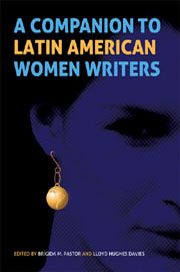Book contents
- Frontmatter
- Contents
- Introduction: The Feminine Voice in Latin American Literature
- 1 Sor Juana Inés de la Cruz (1648/51?–1695)
- 2 Gertrudis Gómez de Avellaneda (1814–1873)
- 3 Gabriela Mistral (1889–1957)
- 4 Alfonsina Storni (1892–1938)
- 5 Silvina Ocampo (1903–1993)
- 6 Clarice Lispector (1920–1977)
- 7 Rosario Castellanos (1925–1974)
- 8 Elena Poniatowska (1933– )
- 9 Alejandra Pizarnik (1936–1972)
- 10 Luisa Valenzuela (1938– )
- 11 Isabel Allende (1942– )
- 12 Rosario Ferré (1938– )
- 13 Laura Esquivel (1950– )
- 14 Laura Restrepo (1950– )
- Conclusion
- Bibliography
- Index
8 - Elena Poniatowska (1933– )
Published online by Cambridge University Press: 05 February 2013
- Frontmatter
- Contents
- Introduction: The Feminine Voice in Latin American Literature
- 1 Sor Juana Inés de la Cruz (1648/51?–1695)
- 2 Gertrudis Gómez de Avellaneda (1814–1873)
- 3 Gabriela Mistral (1889–1957)
- 4 Alfonsina Storni (1892–1938)
- 5 Silvina Ocampo (1903–1993)
- 6 Clarice Lispector (1920–1977)
- 7 Rosario Castellanos (1925–1974)
- 8 Elena Poniatowska (1933– )
- 9 Alejandra Pizarnik (1936–1972)
- 10 Luisa Valenzuela (1938– )
- 11 Isabel Allende (1942– )
- 12 Rosario Ferré (1938– )
- 13 Laura Esquivel (1950– )
- 14 Laura Restrepo (1950– )
- Conclusion
- Bibliography
- Index
Summary
Introduction
Although Poniatowska is not the most internationally recognised of Mexican women writers – that role has been accorded to Laura Esquivel after her phenomenal success with Como agua para chocolate [Like Water for Chocolate] – she is, perhaps, the most widely respected for her tireless journalistic work and for her championing of the Mexican people. Lauded principally for the collecting and editing of testimony, most of her writing deals with extraordinary people or events and reveals her interest in Mexican society and her empathy with those marginalised by poverty, class or disability. In both her fictional and her journalistic work she writes to give a voice to those who have not been heard in Mexican society, particularly before the watershed of 1968. That year on 2 October, precisely when Mexico was about to find itself under the scrutiny of foreign visitors arriving to watch the Olympic Games, the anti-riot police – the granaderos – of Mexico City fired upon civilians in the Plaza de las Tres Culturas [Three Cultures Square], to quell social unrest brought on by the student protest movement a few days before the opening of the Games.
La noche de Tlatelolco (1971) [The Night of Tlatelolco] brings together a combination of testimonials from both victims of and witnesses to the October 2nd massacre in the Plaza de las Tres Culturas, when the army fired upon peaceful demonstrators, including students, housewives and children, killing hundreds of them. The text also includes government-sanctioned newspaper accounts of the event, which were both brief and understated.
- Type
- Chapter
- Information
- A Companion to Latin American Women Writers , pp. 123 - 136Publisher: Boydell & BrewerPrint publication year: 2012



